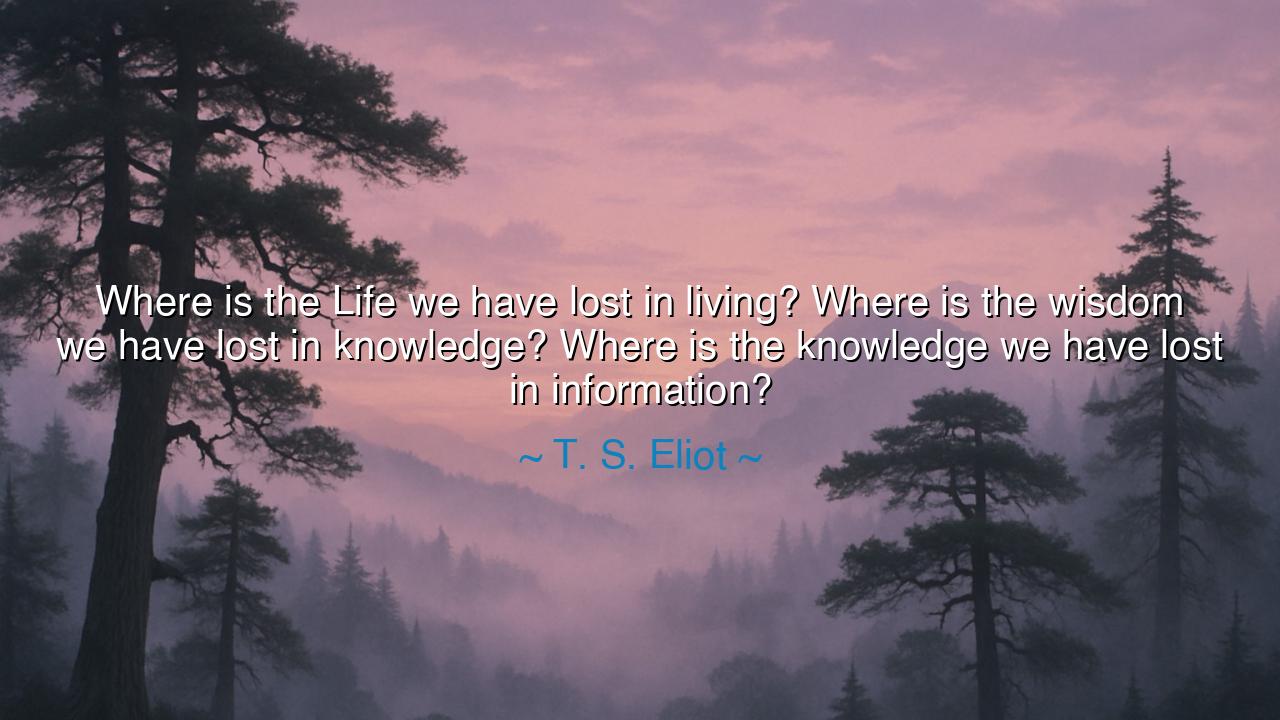
Where is the Life we have lost in living? Where is the wisdom we
Where is the Life we have lost in living? Where is the wisdom we have lost in knowledge? Where is the knowledge we have lost in information?






Hear now the lament of T. S. Eliot, poet of the modern age, who asked with a voice heavy with sorrow: “Where is the Life we have lost in living? Where is the wisdom we have lost in knowledge? Where is the knowledge we have lost in information?” These words cry out like a prophet’s warning against the shallowness of an age consumed with speed, detail, and distraction. They call us to remember that not all progress is true progress, and that the soul of man can be lost even as his storehouses of data overflow.
The first cry—“Where is the Life we have lost in living?”—is a reminder that existence without depth is not true life. Many run endlessly from task to task, breathless and weary, yet never pause to taste joy, to love deeply, or to worship the eternal. To live is more than to breathe; it is to find meaning in the days given. A man may chase wealth or honor and yet, in the rush of living, lose the very essence of Life. Eliot’s question pierces the heart: what profit is there in motion if the soul remains still?
The second cry—“Where is the wisdom we have lost in knowledge?”—teaches that wisdom and knowledge are not the same. Knowledge is the gathering of facts, the accumulation of truths both small and great. But wisdom is the art of applying knowledge rightly, guided by justice, compassion, and humility. A man may know the law in all its detail, but without wisdom he becomes a tyrant. A society may master science, yet without wisdom it may unleash destruction. Thus, Eliot mourns the loss of wisdom in an age obsessed with knowing, but not with living rightly.
The third cry—“Where is the knowledge we have lost in information?”—is perhaps the deepest wound of the modern soul. For the flood of information drowns men in endless fragments, bits of truth scattered like sand, overwhelming but never nourishing. Information fills the mind but does not transform the heart. It can multiply without end, yet without order or reflection it never becomes true knowledge. In this, Eliot foresaw the age of machines, where men might know the weight of every star but forget the worth of a single child.
History shows us both warning and hope. Consider the Renaissance, when Europe rediscovered the wisdom of the ancients. Knowledge was pursued not merely for accumulation, but for transformation—art, philosophy, and science lifted man toward beauty and truth. Yet in other times, such as the Great War, knowledge was twisted into engines of destruction, and information became propaganda. In these moments, the loss of wisdom revealed itself, and humanity reaped sorrow for exalting facts over meaning, numbers over souls.
The lesson, O seekers of truth, is that we must not be satisfied with information alone, nor even with knowledge. We must strive upward, toward wisdom and the fullness of Life. Information must be sifted into knowledge, knowledge tempered into wisdom, and wisdom lived out as true life. Without this ascent, man remains empty, burdened with data but starved of meaning.
Therefore, beloved listeners, let your practice be this: do not merely collect facts—reflect upon them. Do not merely gain knowledge—apply it with love and justice. Do not merely live—live with depth, with gratitude, and with purpose. Guard yourselves against the flood of noise, and seek always the quiet well of wisdom. And remember Eliot’s eternal cry: the measure of our age is not in the abundance of information, but in the depth of wisdom and the fullness of life. For it is there, and only there, that the soul finds its true home.






AAdministratorAdministrator
Welcome, honored guests. Please leave a comment, we will respond soon